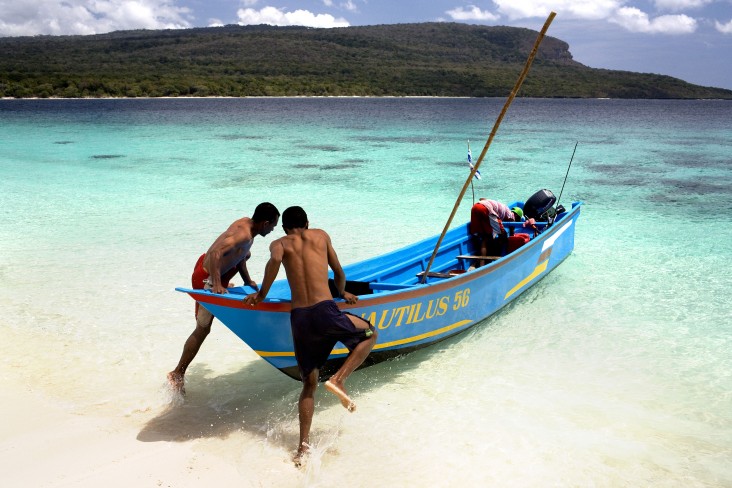
Asia-Pacific nations that ring the pristine Coral Triangle are beginning to pool their ideas and strengthen their collective commitment to protect a delicate regional fish trade sustainably.
Ninety percent of the marine and coastal resources in the 6 million square kilometer Coral Triangle area are at immediate risk. The live reef fish food trade, in which caught fish are kept alive for later sale, comprises 30 percent of the total value of commercial fisheries in the region and employment for an estimated 15 million people.
The future of the fish trade is a major concern in places like Barangay Bacao on the Philippine island of Dumaran. In 2011, a coral reef study revealed the alarming rate of depletion of the corals and fish stocks in Dumaran. The assessment, supported by the USAID-funded Coral Triangle Initiative through the World Wildlife Fund, called for more marine protected areas, which are designated no-take zones for spawning sites and mixed-use sites for general subsistence fishing.
The poor state of the local marine resources prompted local officials to be even more aggressive in enforcing existing marine protected areas and taking steps to develop more areas.
“Illegal fishing activities have decreased, especially dynamite and compressor methods. [Our] mayor is very strict,” said Edgardo Paguntalan, a local fisherman and president of Barangay Bacao’s Fisheries and Aquatic Resources Management Council. “It has been great to see a natural balance restored in the local reefs. We have seen what can happen when steps are not taken to protect the environment, and we want fishing to be a viable way of life for our children.”
With little competition from the illegal fishers, small-scale fishermen in Dumaran have been able to reap their share of the bounty of the sea and improve the quality of their lives.
One of them is Jesus Peañar, a fisherman and live fish trader. He is pleased to be able to build a kitchen extension for his house in Barangay Bacao. He recently installed a well at his property; acquired a new, more powerful motor for his fishing boat; and paid his fishing and caging license fees.
To extend successes like those of Barangay Bacao across the Coral Triangle, USAID partnered with the Coral Triangle Initiative Interim Regional Secretariat and the Southeast Asian Fisheries Development Center to bring together 52 representatives from the Coral Triangle nations to develop a roadmap to address negative impacts on the region’s live reef fish trade.
Government representatives at a forum in Bangkok signed a multilateral resolution in January 2013 to set up marine areas to protect fish species affected by the live reef fish trade and to develop an accreditation system to encourage fish suppliers to follow sustainable and fair trade practices. They will also work together to develop a reporting system to capture relevant fisheries data and traceability, and jointly address illegal, unregulated and unreported fishing practices.
“The establishment of this intergovernmental forum comes at a time when we see even more alarming issues coming out in the trade,” said Chumnarn Pongsri, secretary general of the Southeast Asian Fisheries Development Center. “Coral Triangle governments should use this forum to demonstrate their collective commitment to improve the management of the trade, and to stabilize the welfare of their shared ecosystems and resources for the benefit of the millions of people who depend on these for food and livelihood.”







Comment
Make a general inquiry or suggest an improvement.